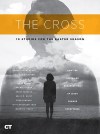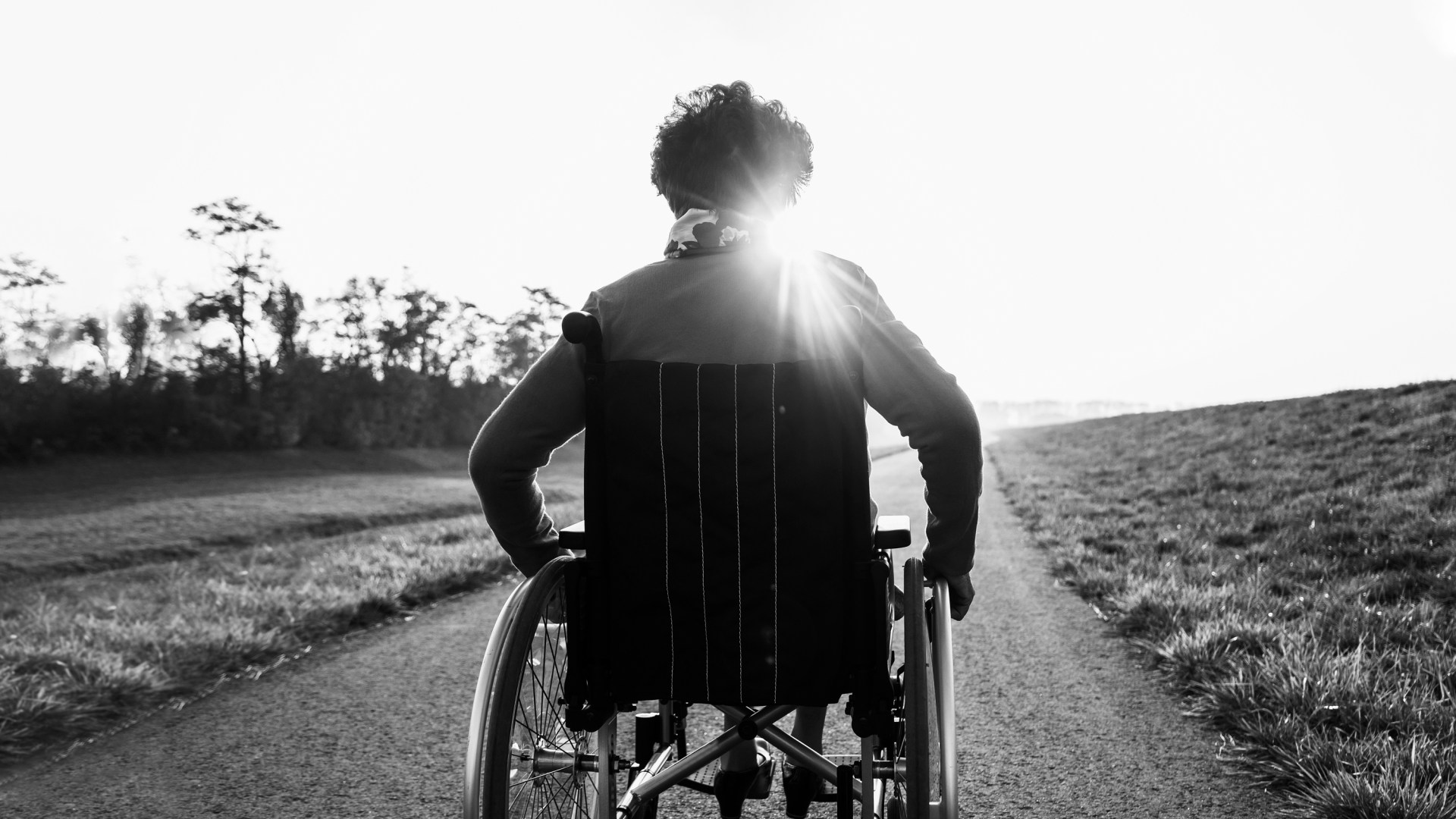“He too shared in their humanity so that by his death he might break the power of him who holds the power of death—that is, the devil—and free those who all their lives were held in slavery by their fear of death” (Heb. 2:14–15).
“Francie, please file this and make copies of this letter, would you?” I hardly looked up from my desk while talking to my assistant. “And, one more time,” I groaned, “would you please pull out the sofa bed?”
For the fourth time that day, I needed to be lifted out of my wheelchair and laid down. We had to readjust my corset—shallow breathing, sweating, and skyrocketing blood pressure were signaling that something was either pinching or bruising my paralyzed body. Francie wiped away my tears. As she shifted my body, examining my legs and hips for pressure marks, I stared at the ceiling. I was done with being paralyzed. I was tired of the never-ending, day-to-day disability routines. I’d had my fill of it and mumbled to the ceiling, “I want to quit.”
“Oh, come on,” Francie joked, “what are you always saying? You ‘can’t do quadriplegia,’ but you ‘can do all things through Christ’?”
I didn’t have a comeback for that one, so I remained quiet. We couldn’t find anything wrong with my body. Francie hoisted me into my wheelchair.
“Where do I go to resign from this stupid paralysis?” I said.
Francie grinned. She’s heard me say it scores of times. As she was about to leave, she paused. “I bet you can’t wait for heaven. You know, like Paul said, ‘We groan, longing to be clothed with a heavenly dwelling.’ ”
My eyes dampened again, but this time they were tears of relief. My Christian friend had just given me a very comforting, powerful reminder. “Yeah, it’ll be great,” I said.
That afternoon, the verse she shared stuck with me, and I whispered a prayer. “Yes, Lord, I do look forward to being whole, to having a body that will never know pain. But to be honest, what I really want is a new heart that doesn’t want to give up or quit.” I sat in my office and dreamed of what I’ve imagined a thousand times: heaven. Jesus’ death and resurrection secured for us many amazing things, and one is a firm hope of eternal life in the new heavens and new earth with no more sorrow, pain, or tears.
It’s all I needed. That afternoon, I jerked my will right-side up, refocused my emotions, and realigned my thoughts. I repeated Psalm 43:5: “Why are you cast down, O my soul, and why are you in turmoil within me? Hope in God; for I shall again praise him, my salvation and my God” (ESV). I kept talking to my soul, mentally rehearsing a flood of other heavenly promises: When we see him, we shall be like him. … For this corruptible must put on incorruption, and this mortal must put on immortality. … That which is sown in weakness will be raised in power. … He has given us an inheritance that can never perish, spoil or fade. … If we suffer with him, we shall reign with him. Before leaving the office that day, I found my courage and said with a smile, “Come quickly, Lord Jesus.”
Physical affliction and emotional pain are part of my daily routine, but I’ve learned that self-pity can be a deadly trap. I quickly move upward and onward. It takes resurrection power to do that. Christ’s death and resurrection won us many amazing benefits, but I think one of the greatest benefits is their power in our daily lives. The apostle Paul said, “I want to know Christ—yes, to know the power of his resurrection and participation in his sufferings” (Phil. 3:10, emphasis added). We share in Christ’s sufferings so that we might become like him in his death—that is, that we may have the actual power to die to the sins that he died for on the cross. In Christ, we have resurrection power to say no to ungodliness and yes to living self-controlled lives; we can become holy as he is holy; we can partner with the Holy Spirit in fitting ourselves for heaven (Titus 2:12; 1 Pet. 1:15; Heb. 11:16).
The death and resurrection of Jesus give weight to the reality described in 2 Corinthians 4:18: “So we fix our eyes not on what is seen, but on what is unseen, since what is seen is temporary, but what is unseen is eternal.” My useless hands—and your wrinkles, your torn meniscus, your failing memory, or your macular degeneration—are only temporary. It’s our response to those afflictions that is eternal. What’s more, those afflictions make the here and now seem so vaporous, so thin and wispy. The span of our earthly lives is limited; each of our bodies will inevitably fail. Christ’s resurrection assures me that a new splendorous body awaits me in heaven. So why should I fear death? It’s a glorious door into Healing with a capital H!
Paul’s desire to “know the power of his resurrection” was tied to this hope: “attaining to the resurrection from the dead” (Phil. 3:10–11). As Paul knew, Christ’s glorious resurrection assures believers of their own resurrection from death into eternal life (1 Cor. 15:21–22). For me, the death and resurrection of Christ have removed every ounce of fear from death. The Grim Reaper is no longer the heinous, sharp-fanged, menacing monster it used to be. Hebrews 2:14–15 is my safeguard against fear, for “by [Jesus’] death he might break the power of him who holds the power of death—that is, the devil—and free those who all their lives were held in slavery by their fear of death.” The Devil has no power over me. I’m free from being a slave to fear—especially fear of death. Affliction has helped make that clear to me.
Most of us are sequestered at home right now, and renewing our devotion to Christ through this time of isolation and “safe at home” guidelines. But how timely is this, given that we are in this season of Lent. This is what Christians do during the Lenten season! Hardships are one way God helps us get our minds on the hereafter. I don’t speak of the hereafter as a death wish, psychological crutch, or escape from reality. I mean “hereafter” as reality. Pilgrims aren’t supposed to feel at home on earth. Their hearts are on things above; they wait on the Bridegroom. They are looking forward to a new body, heart, and mind. Pilgrims think about crowns and rewards and casting them all at Jesus’ feet. Such realities provide a glorious vantage point from which to look upon our pain and problems. The soul that mounts up to heaven’s kingdom cannot fail to triumph.
It’s odd that it took a wheelchair—something that bolts me to earth—to make me see the futility of fighting spiritual battles on the earthly plane. We Christians need to shift to a higher battleground and choose a resurrection perspective in our daily lives. Looking down on my problems through the lens of God’s promises makes my trials look different. When viewed from a human level, my paralysis feels like a huge, impassable wall; but when viewed from above, the wall appears as a thin line—something that can be overcome. It’s a resurrection view, a bird’s-eye view (Isa. 40:31).
Such a heavenly vantage point on our hardships and our mortality is made possible only through the death and resurrection of our wonderful Savior. In the here and now, may we embrace the power of his resurrection to live a godly life. And may we look forward in confident hope to the day when we mortals will put on immortality.
Joni Eareckson Tada is founder and CEO of Joni and Friends, an organization that accelerates Christian outreach in the disability community. Joni is the author of numerous books, including Joni and Ken: An Untold Love Story and When God Weeps.

This piece is part of The Cross , CT’s special issue featuring articles and Bible study sessions for Lent, Easter, or any time of year. You can learn more about purchasing bulk print copies of The Cross for your church or small group at OrderCT.com/TheCross. If you are a CT subscriber, you can download a free digital copy of The Cross at MoreCT.com/TheCross.










